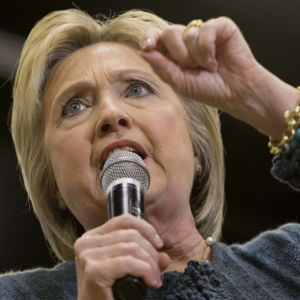Democratic presidential nominee Hillary Clinton argued during a rally Monday in Detroit, Michigan that her rival Donald Trump proved with his own business practices that he is not for workers.
Trump has made protecting workers a cornerstone of his campaign. He has proposed policies to reduce outsourcing and immigration to preserve vulnerable industries like manufacturing. Clinton countered his platform by arguing his business practices paint a vastly different picture.
“He’s gone all over Michigan claiming to be on the side of workers,” Clinton told the crowd. “He especially likes to talk about how he supports American steelworkers. He even had the nerve to brag, and this is a quote, ‘American steel will send new skyscrapers soaring,’ and all the while he was hiding the truth.”
Clinton primarily focused on steelworkers as her main example of how he has undermined industries at home. She also listed his opposition to the auto industry bailouts. Detroit has long held a reputation for industrial and manufacturing type occupations like the automotive industry.
“Donald has no answer when confronted by the report he’s been buying cheap Chinese steel for construction projects, instead of good American steel that supports good American jobs,” Clinton said. “When China illegally floods our markets with cheap steel and people like Donald Trump buy it, it kills good jobs.”
She also argued his stance against the federal minimum wage shows he is not on the side of working Americans. Clinton went on to list the policies she hopes to champion as president. She promised that she will fight to raise the minimum wage and help women get equal pay.
“I believe our economy should work for everybody, not just those at the top,” Clinton stated. “And I’m closing my campaign the way I started my career, fighting for kids and families to make sure every single person in this country has the chance to go as far as your hard work and talent will take you.”
Both Clinton and Trump started off their campaigns with fairly inconsistent views on policies like the minimum wage. Clinton originally said the federal minimum wage should not exceed $12 an hour. She then said during the Democratic debate April 14 that she meant the $12 mark to be a step towards eventually reaching $15 an hour.
Trump has taken several positions on the minimum wage during the primaries. He also faced opposition at the time for saying that wages were too high. He later settled on the stance that the minimum wage should be left to the states instead of the federal government.

